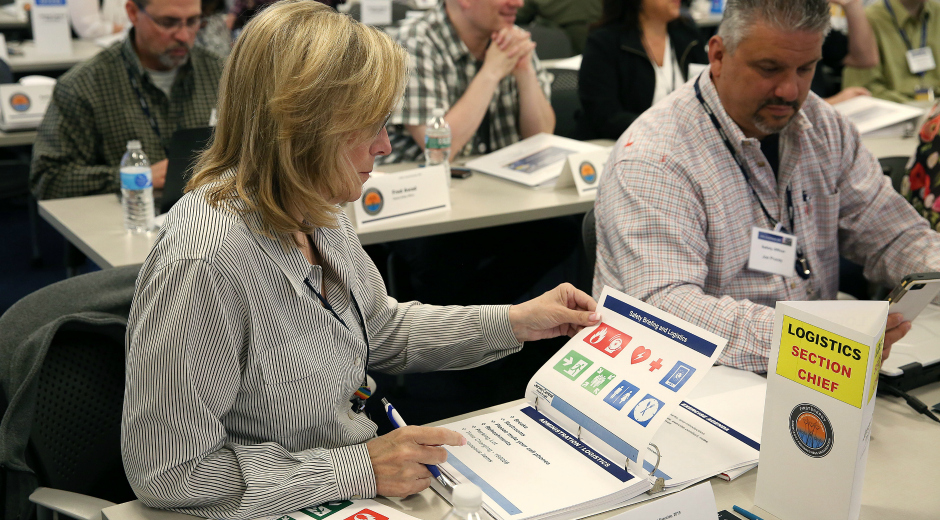Annual Storm Restoration Drill Helps Electric Company Employees Prepare for Severe Weather Events
Exercise familiarizes FirstEnergy employees with storm roles and processesREADING, Pa., May 20, 2024 -- FirstEnergy Pennsylvania Electric Company (FE PA), a subsidiary of FirstEnergy Corp. (NYSE: FE) doing business in eastern Pennsylvania as Met-Ed, recently completed an annual emergency preparation drill focused on testing its storm restoration process in the event severe weather causes outages throughout its vast and heavily forested service area.
Individuals participated in the storm drill both remotely and in-person at Met-Ed's Reading headquarters – a hybrid approach similar to how employees conduct real-life restoration activities using electronic storm tools to manage work in the field. The drill was designed to prepare employees for storm restoration duties and review restoration processes and storm-management tools critical to safely and quickly getting the lights back on.
Scott Wyman, President of FirstEnergy's Pennsylvania Operations: "Storm drills provide our employees a controlled, no-fault forum to practice and sharpen their skills in preparation for severe weather, including summer thunderstorms packing strong wind gusts. Regular emergency drills are another way we work to improve electric service for our customers, in addition to tree trimming and projects we do to harden our electric infrastructure and enhance its resiliency."
The drill's primary scenario focused on severe weather with organized lines of powerful June thunderstorms capable of producing gusts of greater than 70 mph sweeping across Pennsylvania and New Jersey. The gusts toppled trees, causing widespread damage to poles and wires and disrupting electric service to more than 400,000 of Met-Ed's 592,000 customers.
Further complicating the weather drill was a hypothetical second issue that involved significant damage to two electric substations, communications lines and equipment. Drill participants had to quickly puzzle through the safe and efficient restoration of power to customers in the wake of the storm knowing the substations would not be available.
As part of the training, Met-Ed activated its Incident Command System (ICS). ICS is a nationally recognized and accepted emergency management process used by all levels of government – federal, state and local – as well as by many non-governmental organizations and the private sector to coordinate the response to major storms or other natural disasters.
In the aftermath of a major weather event, Met-Ed crews follow a proven restoration process and typically address outages that restore the largest number of customers before moving to more isolated problems. They generally give priority to hospitals and other critical medical facilities, communications facilities and emergency response agencies. After that, crews work to restore power as quickly as possible to the rest of the customers.
For more information about FirstEnergy's storm restoration process and tips for staying safe, visit the 24/7 Power Center at firstenergycorp.com/outages.
Met-Ed serves approximately 592,000 customers within 3,300 square miles of eastern and southeastern Pennsylvania. Follow Met-Ed on X, formerly known as Twitter, @Met Ed and on Facebook at facebook.com/MetEdElectric.
FirstEnergy is dedicated to integrity, safety, reliability and operational excellence. Its electric distribution companies form one of the nation's largest investor-owned electric systems, serving customers in Ohio, Pennsylvania, New Jersey, West Virginia, Maryland and New York. The company's transmission subsidiaries operate approximately 24,000 miles of transmission lines that connect the Midwest and Mid-Atlantic regions. Visit FirstEnergy online at firstenergycorp.com and follow FirstEnergy on X @FirstEnergyCorp.
Editor's Note: A photo of FirstEnergy employees conducting a storm drill is available for download on Flickr.
MEDIA CONTACT: Todd Meyers (724) 838- 6650 INVESTOR CONTACT: Irene Prezelj (330) 384-3859

